Last week the second instalment of the LU Open Science Days took place at Palaestra. The conference committee was happy to welcome 150 participants from LU as well as both Swedish and international organizations and institutions. The theme for this year’s conference was Crossing boundaries with Open Science focusing on how Open Science can bridge boundaries, both within academia and in society at large.
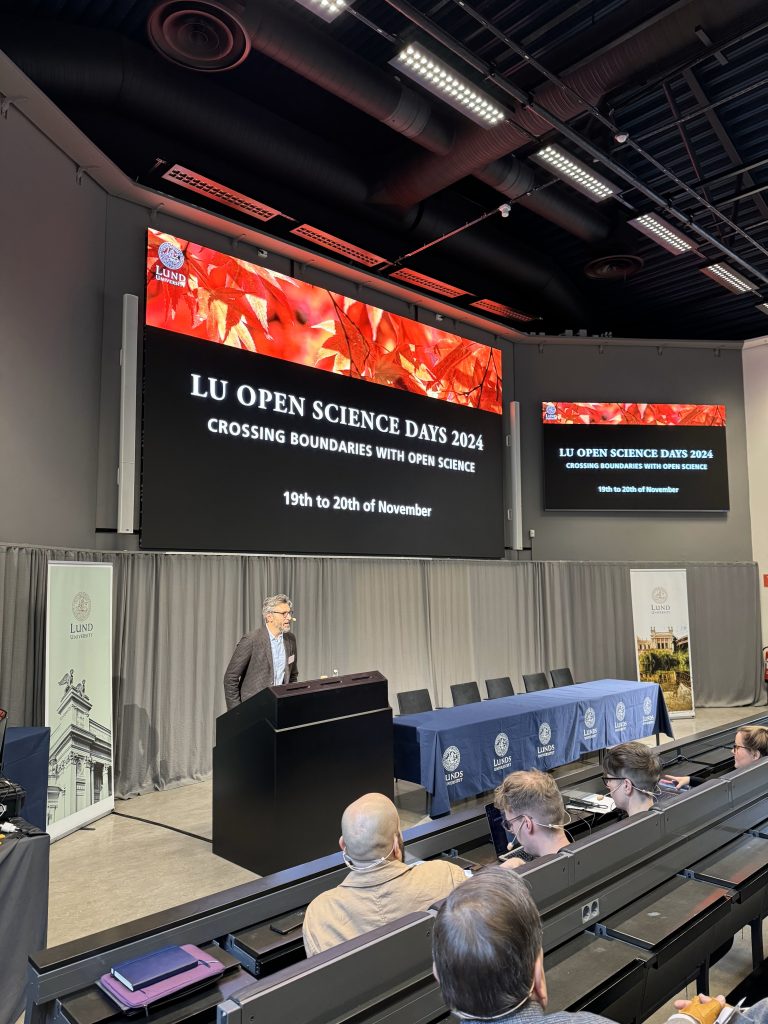
In their welcoming speech, Pro-vice chancellor Per Mickwitz and chair of the programme committee Angeliki Adamaki introduced the organisers of the event, the LU Open Science Champions Group, and how Open Science principles can benefit not only individual researchers and academia but society at large. Per talked about how the current geopolitical insecurities has led to some people saying that we have already passed the peak of Open Science. The pro vice-chancellor said that “we need to speak up for Open Science”.
The welcome speech was followed by a session on broadening of merits and recognition of Open Science contributions in research. Keynote speaker Björn Hammarfelt, professor at the Swedish School of Library and Information Science, spoke about possible future scenarios for Open Science in regard to merits: openness can become a metric in itself, how researchers are assessed can be opened up and reformed, assessment procedures and indicators can become more open. Concluding, Hammarfelt stated the importance of keeping Open Science flexible and non-standardized, not only benefiting the already privileged few within research.
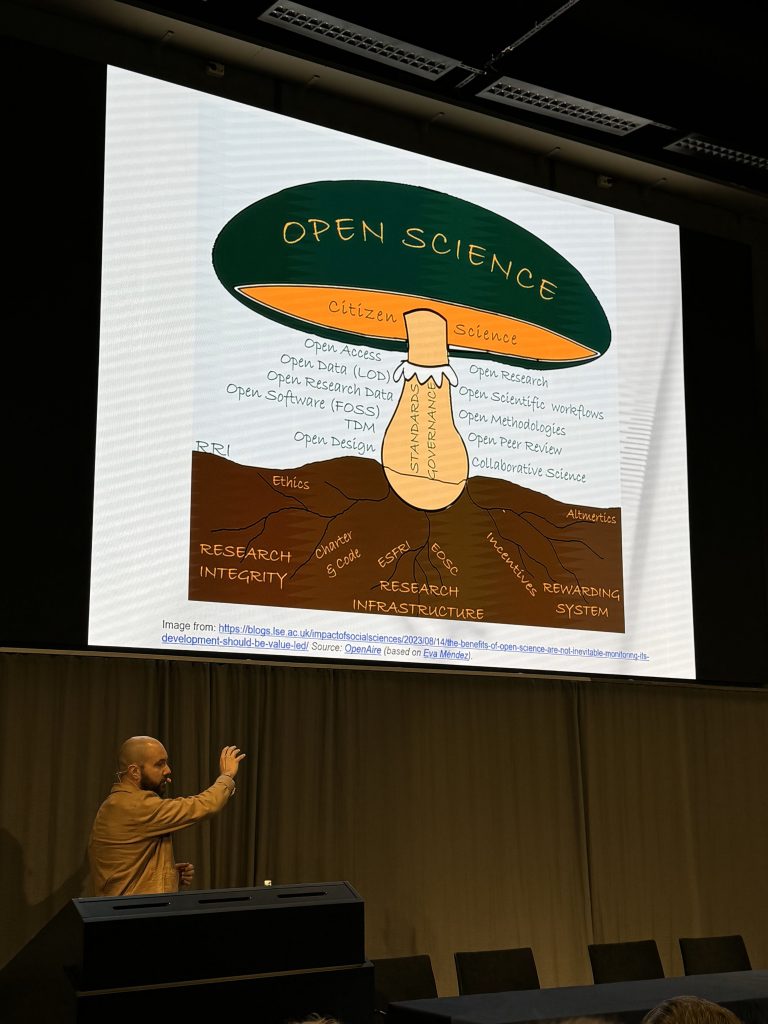
The following panel discussion with Jonathan Nästesjö, Alison Gerber, Johan Revstedt and Björn Hammarfelt led by Nicoló Dell’Unto continued on the same theme and the complexity of the notion of openness and reforming rewards and incentives. Among the things addressed was that changes are needed on both a university management level and community level.
In line with the aim of LU Open Science Days to be a platform for sharing ideas and experiences of practicing Open Science we invited six speakers to present their Open Science projects. Andrea Tarallo, National Research Council of Italy (CNR), Institute of Research on Terrestrial Ecosystems (IRET), presented the Italian data stewards community, established in 2023 as a bottom-up initiative, and how the community has evolved from a loose network into a more structured entity. Jane Fisher, AdvanSci, gave an introduction to the ReproducibiliTea initiative and the Lund-based journal club that explore challenges in reproducibility within biomedicine and the wider scientific landscape. Carlos Vélez, LUCSUS, talked about his research project concerning sustainable wildlife management in the Colombian Amazon region inspired by Participatory Action Research (PAR), practicing participatory research with two teams of local indigenous researchers. Lydia Bucher from the student organisation iGEM Lund, outlined their outreach activities such as workshops for high school and middle school students and social media engagement. Per Wilhelmsson, PKI Utveckling, presented Sjölabbet, a research-through-education initiative that promotes the use of the open source hardware OpenFlexure microscope (OFM) in educational settings. The microscope is used for aquatic environmental monitoring. Lastly, Massimiliano Novelli from ESS introduced ESS approach to FAIR data management and its integration with the PaNOSC (Photon and Neutron Open Science Cloud) data portal to support a collaborative and data-driven scientific ecosystem.
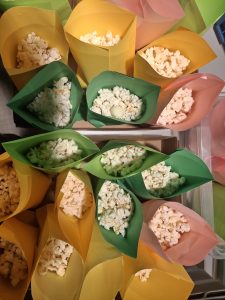
The last session of the day featured a film screening of the film Who stands up for Alvar. The film is based on research data from the research project “Moral stress and moral agency in Swedish eldercare”. The screening was followed by a discussion between the director Anna Maria Jóakimsdóttir Hutri and Sara Hultqvist, School of Social Work, about how art and research can be cross-fertilized and serve as a catalyst for social change. Jóakimsdóttir Hutri received the research data in the form of small stories and moral dilemmas that she in turn shaped into a script for the drama. Hultqvist and Jóakimsdóttir Hutri also talked about how the film created a space for all care workers, regardless of professional role or educational level, to have their voices heard.
During the poster mingle a diverse set of exhibitors displayed their Open Science projects and initiatives. Exhibitors included Carbon Ruins, a portable museum created by Narrating Climate Futures at LU, Vattenhallen Science Center, The Swedish National Data Service, Lund University Press, the LUCRIS administration and Skissernas Museum – Museum of Artistic Process and Public Art.
Keynote speaker on the second day, Mirjam Walpot from the International Network of Open Science & Scholarship Communities talked about the importance of communities in the transition to Open Science. The transition towards making Open Science the norm can be conceptualised via five interventions: infrastructure, user experience, communities, incentives and policy. Here, communities are a part of making Open Science normative and something that not only concerns a small number of early adopters but a majority of researchers. Communities can also be a way of influencing policy making and incentive structures. Mirjam Walpot is originally from the Netherlands, where the Open Science Community has been involved in the Netherlands National Program Open Science 2030.
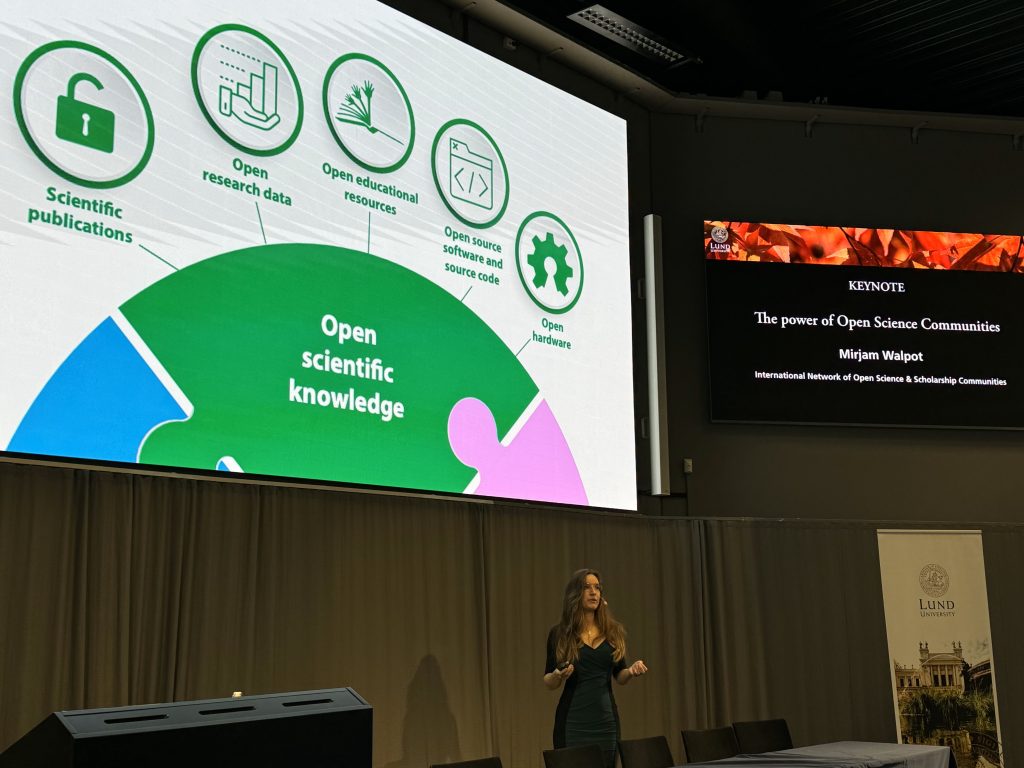
During the panel discussion on Open Science and the climate emergency Aitzkoa Lopez de Lapuente Portilla, Division of Hematology and Transfusion Medicine, talked about the role of researchers and universities in not reproducing unsustainable practices but being advocates for change. Researchers, by virtue of their expertise, connection to decision making, platforms and implicit authority, have the levers organise and take direct action for the climate. James White, Department of Technology and Society, talked about the environmental impact of the use of AI. AI tools are often presented as unproblematic from an environmental standpoint and the energy consumption needed to power these tools overlooked.
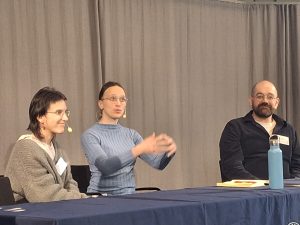
The last panel discussion concerned the geopolitical aspects of Open Science, focusing on East Asia. Hyejin Kim, Department of Economic History, outlined shifting patterns within international research collaboration. Focusing on collaboration rates of Chinese-based scholars, Kim showed the development of co-authorship with Chinese-based scholars and scholars from The United States as well as East and South-East Asia. Nicholas Loubere, Centre for East and South-East Asian Studies, talked about the dangers of Open Science being co-opted and redefined by authoritarian interests.
The conference closed with a community building session and the launch of Open Science Community Lund (OSCL). OSCL is a hub that connects researchers and employees at the university that believe in open science as means to increase inclusivity, quality, transparency and integrity in research. The community is a bottom-up initiative that aspires to facilitate the adoption of open science practices for the benefit of both research and society. OSCL welcomes members in all career stages and from all departments at the university with interest in any aspect of open science. You decide your level of engagement with the community and it range from organiser of events to supporter of the community’s work. If you want to be part of, or informed about the progress of the Open Science Community Lund, please sign up here.
Most slides from the conference are available in the programme blog post.
We would like to thank Lund University Press, who have kindly gifted us 11 printed copies of their Open Access books, that will be drawn by lot to a few lucky participants. Keep a look out in your mailboxes.
Thanks to all who attended and contributed to the LU Open Science Days 2024!
